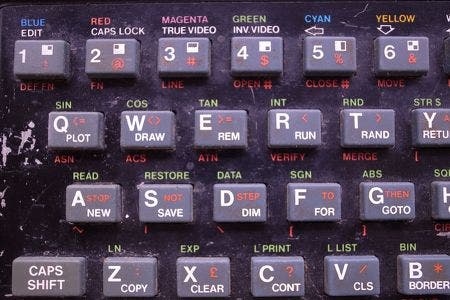Spectrum Made Me
The Sinclair ZX Spectrum is 30 today. Oli remembers the cheap British computer that changed his life.
Today is the 30th anniversary of the launch of the Sinclair ZX Spectrum. Its story has been told many times. This cheap, flexible machine from British entrepreneur and inventor Sir Clive Sinclair flooded UK homes, nursed a computer-literate generation and kick-started Britain's astonishingly dense and prolific cottage industry in computer games - an industry whose fading after-image can still be seen today in studios like Codemasters, Rare and Sumo Digital.
But that's not the story I want to tell.
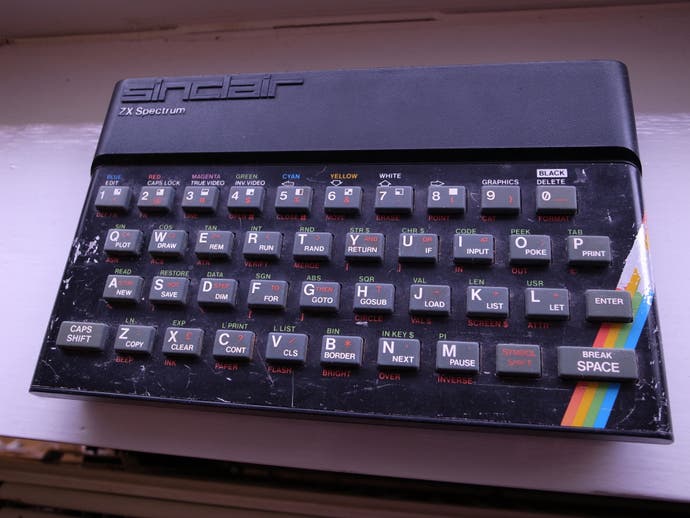
I still have my 48K Spectrum. There it is on the right. It's scratched and battered but, last time I plugged it in (I had to use one of those ridged, grey power supplies from the later Amstrad era, much to my distaste), it still worked. I've kept hold of some game tapes for it too, not that I could get any of them to load.
Now, I'm not particularly sentimental when it comes to physical objects, and by nature I'm no collector. But my Spectrum lives in proud display on my shelves - and not out of a hipsterish affection for '80s bric-a-brac either, although the charm of its tidy, colourful and compact design is undeniable. For me, the Spectrum - this Spectrum - is an object of rare totemic power. It forms a sizeable portion of who I am, and I wouldn't be writing this to you today without it.
My father taught computing (among other things) and in the early '80s brought several machines home from work for us to fool around with, including a Texas Instruments TI-99 and - fatefully - a Sinclair ZX81, the Spectrum's even more lightweight predecessor, with its crude membrane keyboard and black-and-white display. We soon had one of our own and I have a vivid memory of playing the text adventure Inca Curse on it, the whole family huddled around the machine where it was set up (inexplicably) in the hallway, debating the solutions to the game's riddles.

While other science teachers spent their budget on one or two of the sturdy, government-approved BBC Micros, my dad filled his computer room with ZX81s hooked up to a motley assortment of second-hand TVs. This was partly just because he was in love with Sir Clive - exactly the kind of crackpot engineer he romanticised and aspired to be himself - and it's true that the ZX81s were primitive, unreliable and annoying to use. But there was method to his madness, too. He simply had more machines for his money, and could get more kids more screen time. He thought everyone should know how to use a computer, and he was right. So when the ZX81's equally cheap-and-cheerful successor arrived, he bought a bunch of Spectrums for the school and one - the 48K "rubber-key" model - for our home.
I'm not going to indulge in any nostalgic format-warmongering here. In fact, I always liked the Commodore 64's pleasing keyboard and its smooth, colourful graphics. But let's be absolutely clear: my family could not afford one, and that makes all the difference in the world. Sinclair was nothing less than a socio-economic force for good in the UK, and the Spectrum's rampant popularity started - among kids and enthusiasts at least - an actual cultural movement. For its time, the Spectrum is as deserving a British icon as Sir Alec Issigonis' Mini or The Beatles' Sgt. Pepper.
From the moment I came into contact with computers, all I wanted to do was play games on them, and with the Spectrum games were everywhere. They were ubiquitous and accessible in a way that probably hasn't been true for any other format until the iPhone. There were hundreds of them, dozens released every month for pocket-money sums, and so many kids had Spectrums that you could get whatever you didn't have through a peer-to-peer network of C90 compilations far more precious and full of promise than any music mixtape.
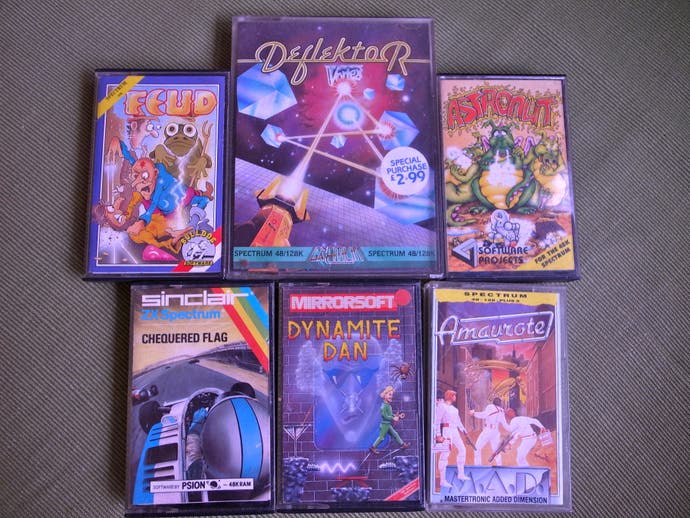
We didn't think of it as piracy, and we still coveted the official tapes with their lurid, airbrushed covers. But we were diving headfirst into a new-born universe of entertainment and hungrily sampling every species of it we could find, by any means necessary. I was never very good at games (I'm still not) but the Spectrum allowed me to be an expert in them: a cultural explorer and curator, a role I've relished my whole life and am now lucky enough to call my job.
I played and played, often spending whole weekends clustered around the tiny keyboard with my friend Rob. I particularly loved platformers (Dynamite Dan and Dan Dare stand out, as well as the Matthew Smith classics), driving games such as Super Sprint and Turbo Esprit and the beautiful and mysterious worlds of arcade adventures like Alien 8 or Nodes of Yesod.
But I didn't discriminate. I didn't have to - the Spectrum had everything, and it fostered curiosity. Its poor sound and bizarre graphical set-up (which allowed multiple colours to be displayed, but never in the same part of the screen at the same time) took the emphasis off audio-visual wow factor and forced programmers and artists to think with a creativity that rubbed off on players. The system's limitations laid bare, your appreciation of the ingenuity that went into the making of a game, and the value that you placed on good gameplay, were all the greater.
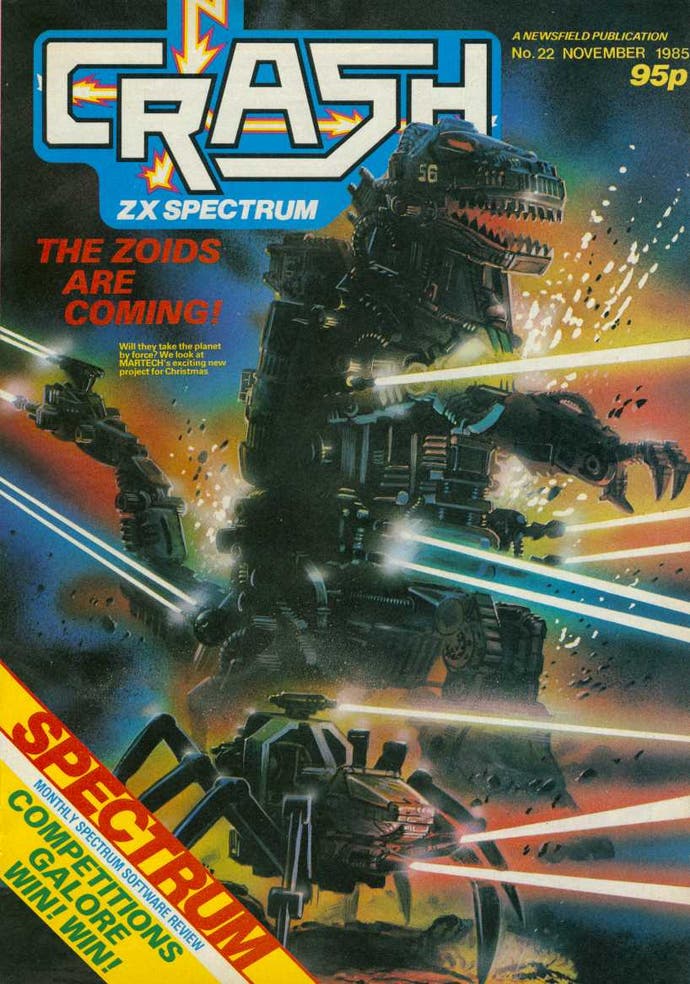
And how to keep track of it all? Through magazines, of course: in my case, Crash, with its luscious Oli Frey cover artwork and avuncular yet authoritative house style. I bought every issue and almost cared about it more than the games themselves, devouring the reviews section in particular so that I could even understand those games I couldn't get around to playing. Crash stirred a love of specialist magazines in me that looped through Q, Empire and Neon before coming back to games with Edge; that trajectory was matched beat-for-beat with a personal obsession with the art of review writing and dream of becoming a professional critic (also realised in Edge). It's still one of my proudest childhood memories that, aged 13, I won letter of the month in Lloyd Mangram's Forum with a balanced assessment on the importance of originality versus execution in games, inspired by Faster Than Light's excellent shoot-'em-up Lightforce.
My dad didn't really approve of me spending all my computing time on games, but he mostly left me to it - perhaps because anything at all to do with computers was exciting to him, perhaps because he wasn't completely immune to games' charms (I remember discovering him squatting on the living room floor, trying to unpick a puzzle in the Stamper brothers' fabulous Alien 8 with clumsy stabs of his fingers), perhaps because he could sense that I was becoming a true enthusiast, and enthusiasts were OK in his book. It was my brother who had to bear the full burden of his expectations though, because he was as compelled to program our Spectrum as I was to play games on it.
For my birthday one year, my brother wrote a simple, pretty platform game called Frank the Flea on the Spectrum in BASIC. He must have been 15. He even sold a handful of copies (for £1, a blank tape and a self-addressed envelope) after getting it reviewed in Crash, scoring a creditable 57%. ("Frank hops around the screen in smooth arcs and, as fleas go, is quite convincing.") Someone - not either of us, I promise - has even uploaded Frank the Flea for posterity so that it can be played on an emulator today.
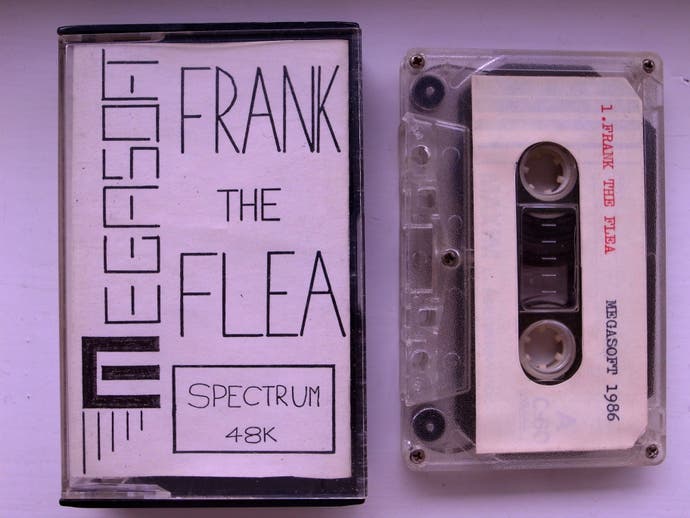
Perhaps this story would be neater if my brother were a games designer now, but in truth, he was never that interested in games, and Frank the Flea was more demonstrative of his passions for problem-solving and graphic design. But he is a programmer to this day - so, in a very real sense, we both owe our careers to that Spectrum.
Our story is common enough, of course, and it's not unique to the Spectrum either. All of this might conceivably have happened if we'd had a BBC Micro or C64. But by sheer dint of lowering the barrier to entry, the Spectrum increased the chances of it happening - and changed the flavour of what happened.
Those other computers were good and they were popular, but - on a national, social and for me, personal level - the Spectrum was a phenomenon. It was a mercurial presence, a flashpoint, and it changed everything. It changed me.
